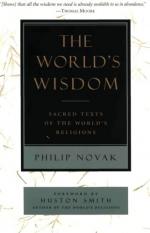|
This section contains 739 words (approx. 2 pages at 400 words per page) |

|
Chapter 4: Taoism Summary and Analysis
The Chinese believe that we live in a world of contrasts—yin and yang, light and dark, male and female. It follows then that a combination of Confucianism and Taoism would appeal to them. Confucianism focuses on will and rational behavior and Taoism, while not the exact opposite of Confucianism, advocates instinct and creativity. The blending of these two spiritual concepts represents the balance that the Chinese feel comfort in. Both religions entered the Chinese culture around the same time in the sixth century BCE.
Lao Tzu, a legendary figure who was fifty years older than Confucius, is credited with establishing Taoism. Lao Tzu wrote the Taoism Bible and the Tao Te Ching. The Tao Te Ching is a surprisingly brief work and has become an inspiration for people of all walks of life. The second greatest sage...
(read more from the Chapter 4: Taoism Summary)
|
This section contains 739 words (approx. 2 pages at 400 words per page) |

|




